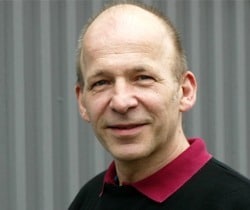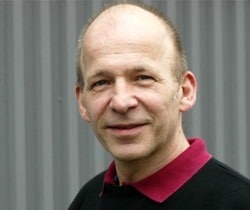How do you become happy in the gay scene? Alexander Popp, 49, managing director of the Federal Men's Forum gives tips and reveals tricks
What phases of life have you already lived through?
I count my life in seven-year rhythms, of which there are now again seven over. For the first three years of seven, i.e. until the age of 21, being gay wasn't defined for me and it wasn't public either. If anything, I lived with this topic in a very hidden way, only for myself and in isolation. Then came the first phase of seven, when I came out to myself. I realised that I was gay, I was also living in the scene, but completely anonymously. I didn't share this knowledge with friends. My life was a kind of double life, that was the eighties. Then I had my political coming out in the fourth phase of seven, so from the age of 28, when I went public with my gayness, also in the political public. At that time, I co-founded the Rosa Liste in Munich. This was very quickly followed by involvement in the AIDS organisation and in gay communities. That lasted for the last 21 years, until today.
What are your current needs when it comes to the scene?
I feel that being gay also has a political meaning. That's why I'm also involved in political movements and have organised structures with structured like the Sgay network NRW or the Arcus Foundation. Those were my needs, I stuck to them and I realised them, took on responsibility and got involved. And that's why I withdrew more and more from the commercial scene, because the needs that I have are not being met there.
What significance have the gay scenes had for your different needs over time?
When I wasn't openly gay, I was mainly interested in places where I could remain anonymous. I would have had problems going to a nice, gay pub, so I was more likely to go to a sex shop or a porn video shop. After my political coming out, the gay and lesbian centre in Munich, the SUB, played a big role, as did all the pubs and discos. Even when I moved to Cologne, the pubs played an important role, if only to get to know people. Today, the commercial scene still plays a role when I want to go out, but I don't have any offers in the gay scene. We need an English-style club where you can sit comfortably, eat, chat and play together. A club where sexuality is not the main focus. Such a need of older men is not recognised or realised. For me personally, the sex scene is becoming less and less important. Sex parties, sex pubs - I've long since lost interest in them. I still have sex, of course, but no longer in a sex pub. I was very involved in the political scene, in the gay movement, and also took on responsibility. That's also where I tended to find my friends. The older I get, the greater the desire for committed relationships that don't exist in the commercial scene. When I used to go out, I always met people my own age. You met in the pub like in a living room. You could go out and there was always someone there. That has changed over the years because men my age don't go out so easily anymore, at most you go out with friends.
Why do needs change?
Everyone experiences changing needs in the course of their lives. That's just the way it is, especially needs in connection with sexuality change. The question of the meaning of friendship also changes, and that's nothing specific to gay men.
Is that a bad thing?
God forbid, on the contrary, that's nice! Because it also makes the relationships you have more binding, more reliable and more stable. The younger you are, the more you have to build that up. Gay men also have to do this more than many Heterosexuals, as they cannot fall back on traditional living arrangements. Young straight men who at some point marry and Have children, are thus involved in a social environment in which they also find friends and acquaintances. Gay men have to make more of an effort to find them. A young father finds acquaintances at nursery and later other parents at school, but gay men don't have that. Gays therefore have a much bigger task.
How do you realise that needs are changing?
That is a process. It happens automatically. A baby only needs to drink, sleep and pee. Over time, it gets bigger, it wants to know something and understand the world. As a child and teenager, you want to know even more and have a degree. As an adult, you want to conquer the world and maybe change it again at my age.
How do I find my personal scene happiness?
Be and stay true to yourself and look after friends who share life with you. That's the job if you don't want to crash or become unhappy. You also have to reach out to others, you have to seek them out. I don't know if that's harder today than it used to be, but it's definitely different because we have completely new contact platforms. the Internet, where learned patterns of social behaviour and values such as honesty and sincerity are often no longer apply. I can't see the other person, they can tell me what they want, real fairy tales can be built up. That makes you insecure. I still think personal contact is very important. I also believe that it's important for gay people to have gay friends. It's not only important when you're coming out that you try to get to know other gay men who are on the same wavelength in order to get out of isolation. Hopefully, some of the programmes that now exist in the scene, such as youth clubs, can help with this.centres for lesbians and gays.
How do you stay true to yourself?
Staying true to yourself means being true to yourself. The fact that people become ill has a lot to do with the fact that they cannot be true to themselves and devalue their own homosexuality and therefore themselves. It is a great achievement not to do this, it requires self-confidence, which must be strengthened. Not only do individuals have to do this for themselves, we also need a general atmosphere and political attitude that strengthens gays and lesbians in their identity. This is a lifelong process, just as coming out is a lifelong process, it is never complete.
Interview: Clemens Glade











